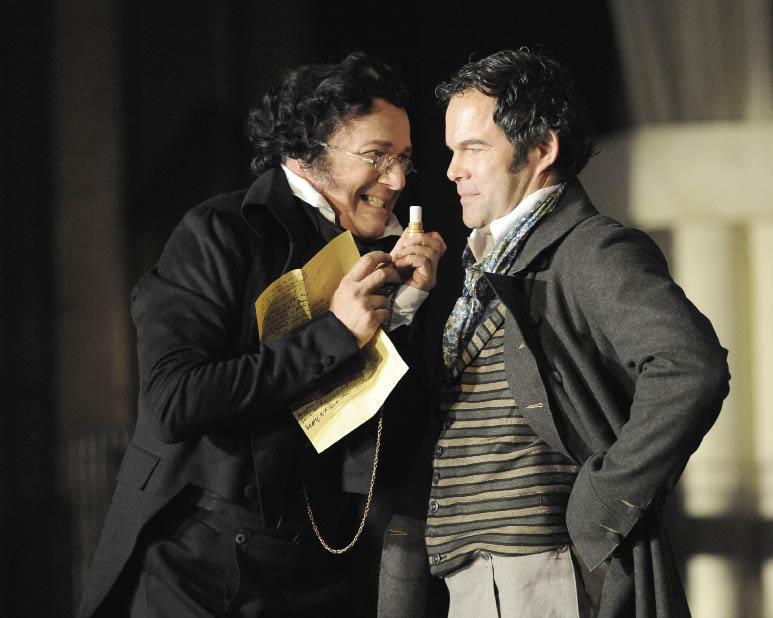Wagner’s Die Meistersinger von Nürnberg is one of the most taxing of all operas to stage, with a large cast, gigantic proportions and requirements of stamina, both musically and emotionally, such as very few works make.
Wagner’s Die Meistersinger von Nürnberg is one of the most taxing of all operas to stage, with a large cast, gigantic proportions and requirements of stamina, both musically and emotionally, such as very few works make. Yet it has received two superb productions in the UK in the past 12 months, the second of which opened at Glyndebourne last Saturday, before an extraordinarily attentive and rapturous audience. It is primarily an all-round triumph, with a production which is as responsive to the many-sidedness of Wagner’s great drama as the musical side is alive to the amazing inventiveness of the score. Oddly enough, the Prelude to Act I was the least inspired part of the evening, a competent but unexceptional account of the done-to-death piece. But as soon as the curtain rose — at the end of the Prelude, thank heavens — everything took off and stayed airborne.
The basic setting is of gothic arches with a delightfully patterned ceiling which easily changes from St Catherine’s church to a nocturnal street scene, on to Sachs’s well lived-in workroom, and finally a festive meadow. The period is early 19th century, a harmless updating though one in which I don’t see a lot of point.What is wonderful, and most important, is the delineation of character that David McVicar has achieved, so that for once it really is true that each Master is an individual, warranting the loving roll call of names that Wagner awards them. This pays off most brilliantly in Act I, which can easily seem episodic and lacking in direction, but in this production is alive and energising in every moment.
The Masters’ meeting really is like a committee, yet thanks to the wit of the text and the resourcefulness of the music it is that unimaginable thing, a ‘transfigured’ committee, with agonising longueurs for the participants, but pure joy for the spectators. Yet McVicar achieves all this without intrusive fuss or business, so on a crowded stage it’s always clear what matters most. And Vladimir Jurowski, showing himself to be much more attuned to Meistersinger than he was even to Tristan, lovingly coaxes every yearning or humorous phrase from the superlative, tireless London Philharmonic, while maintaining a sure grip on the vast structure.
Topi Lehtipuu makes an ideal David, a lolling, loquacious artful dodger, someone who will give his Magdalene a trickier time than any other I’ve seen; with already the voice of a Master. His reluctant pupil Walther was harder to make out. Marco Jentzsch sings ardently, looks the tall toff, but has an ungainly stage manner, though he built up successive verses of the Prize Song, aided at every moment by Jurowski, brilliantly. Enter the top-hatted Pogner, Alastair Miles, and though he is no black-voiced German bass, he is still magnificent, making one wish, as all great Pogners do, that he didn’t have such long absences from the stage. His scene with his daughter Eva at the start of Act II was as moving as anything in the opera, as it should be.
The role of Eva is short but demanding, and reluctantly I have to say that Anna Gabler was the weak link, without which it seems that any Meistersinger cast is incomplete. Her other suitor Beckmesser is a vituoso portrayal by Johannes Martin Kränzle, a man so ill at ease with himself that he has to spend most of his energy finding what makes other people miserable.
At the centre, of course, Hans Sachs, the immense role undertaken surprisingly by Gerald Finley, and with unqualified success. Where the great Bryn Terfel in Cardiff last year was a stupendous vocal feast, and a lovable resigned elderly man, Finley is all intensity and industry, given to spasms of emotion, even possibly slightly unstable. That makes the relationship between him and the other principals edgy, so that whenever he and Eva are onstage there is serious tension, and he has a complex feeling about Walther too. Finley stayed the longest of all operatic courses without a trace of strain. No space to do any more praising except to say that the chorus is marvellous, the fight at the end of Act II the most convincing I have seen.
The new production of Britten’s A Midsummer Night’s Dream by Christopher Alden for ENO has predictably divided opinion, with most reviewers enthusiastic about the turning of the work into an exploration of schoolboy and schoolmaster sexuality. This, for me, fragile opera, Britten’s weakest, needs loving treatment, not this intrusive and impertinent pseudo-biographical approach, which would have left me embarrassed if I hadn’t been so bored. Whatever may have lain behind Britten’s adaptation of Shakespeare, it is the producer’s job to realise the work that was achieved. What Alden has done is just as shocking as it would be if the music we had heard was from Britten’s preliminary sketches rather than what he chose to publish.






Comments